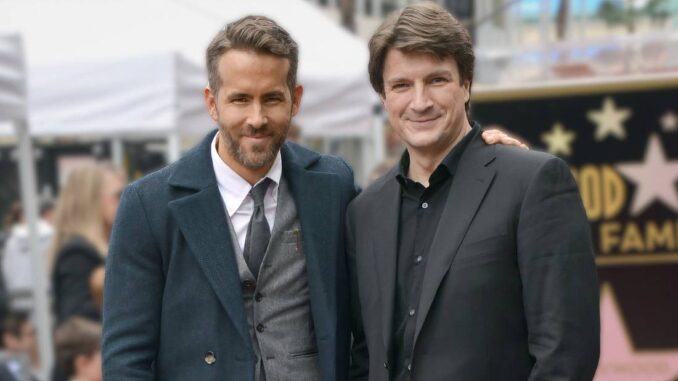
In the sprawling, often-unpredictable galaxy of Hollywood, careers are forged in a crucible of small roles, forgotten pilots, and blink-and-you-miss-them appearances. Yet, even among the most seasoned star-gazers, certain discoveries can elicit a genuine jolt of surprise. Such is the case with a particular relic from the late 1990s: a seemingly innocuous sitcom where two future titans of charisma, Nathan Fillion and Ryan Reynolds, briefly shared a cinematic universe. The show was Two Guys and a Girl (later Two Guys and a Girl and a Pizza Place), and for many fans, unearthing Fillion’s significant, albeit temporary, role alongside a nascent Reynolds is like an archaeological dig into pop culture history that truly shocks.
Nathan Fillion, the scruffy-charming captain of Serenity, the witty detective of Castle, and the earnest rookie of The Rookie, embodies a particular brand of heroic everyman. His career, marked by a passionate fanbase and a knack for genre-defining roles, seems almost preordained. Ryan Reynolds, on the other hand, is the sarcastic maestro, the self-aware action hero of Deadpool, the charming rom-com lead, and a master of the fourth wall. Their current personas are so distinct, so iconic, that the idea of them quietly co-existing in a conventional, albeit popular, sitcom feels almost anachronistic.
Two Guys and a Girl, which aired from 1998 to 2001, was quintessential late-90s fare: a group of twenty-somethings navigating friendship, love, and life in Boston. Ryan Reynolds was one of the titular "guys," Berg, a slacker graduate student with a penchant for bizarre theories and rapid-fire, often nonsensical, comedic delivery. Even then, Reynolds's trademark wit and physical comedy were undeniable, a raw, unrefined version of the quippy, confident star he would become. He was the show's comedic heartbeat, the character around whom much of the absurdity revolved.
Enter Nathan Fillion. For a significant stretch of the show's third and fourth seasons, Fillion played Johnny Donnelly, the earnest, dependable, and undeniably handsome firefighter who becomes a love interest for Sharon, one of the main characters. Johnny was the antithesis of Berg – grounded, responsible, and radiating an easygoing charm that hinted at the leading man he was destined to be. He was the stable anchor to Berg's comedic chaos, a surprisingly conventional romantic foil in a show that often leaned into the absurd.
The shock for modern fans stems from several points. Firstly, it’s the sheer "forgotten" nature of the role. Fillion's tenure on the show predates his breakout cult status in Firefly by several years, and even before his supporting turn as Caleb in Buffy the Vampire Slayer. For many, his career truly began with Firefly, making Johnny Donnelly a largely unremembered stepping stone. Discovering him in such a standard sitcom, playing a relatively vanilla love interest, is akin to finding an early, earnest sketch by a master painter known for their bold, abstract works.
Secondly, and perhaps more potently, is the juxtaposition of their future superstardom against the backdrop of this relatively humble beginning. We now see Fillion as the swashbuckling space captain or the best-selling mystery writer who solves crimes, and Reynolds as the unkillable, wise-cracking mercenary or the voice of Detective Pikachu. To witness them in their primordial soup of nascent talent, before the iconic roles defined them, is a fascinating exercise in celebrity archaeology. It highlights the vast chasm between the characters that launched them into the cultural lexicon and the foundational work that honed their craft. There are glimpses of their future selves – Reynolds’s inimitable rhythm and Fillion’s inherent likeability – but encased in a package that feels almost alien given their current stratospheric fame.
Finally, while Fillion and Reynolds didn't have extensive direct interaction on screen as primary characters, their shared space on the same call sheet, in the same opening credits, is enough to cause a double-take. It's a small, unexpected confluence of talent that, in hindsight, feels remarkably prescient. It reminds us that even the most celebrated actors endure a long and winding road, often taking roles that are less about immediate glory and more about gaining experience, paying the bills, and simply being present in the ecosystem of television.
Nathan Fillion's role as Johnny Donnelly in Two Guys and a Girl is more than just a forgotten credit on an IMDb page; it's a surprising testament to the journey of two actors who would become synonymous with charm, wit, and distinctive on-screen personas. It's a charmingly ordinary precursor to extraordinarily vibrant careers, a quiet whisper before the roar of global recognition. For fans, it's a delightful, slightly disorienting discovery, a reminder that even the biggest stars once started small, honing their craft in the unassuming, yet utterly vital, laboratories of early television.